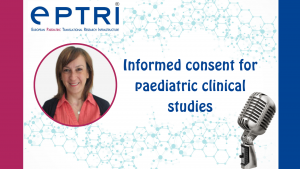 Today we have with us Viviana Giannuzzi, coordinator of the research department at Fondazione per la Ricerca Farmacologica Gianni Benzi Onlus, ethical and regulatory expert in EU and national research projects, member of the Paediatric Committee (PDCO) at the EMA.
Today we have with us Viviana Giannuzzi, coordinator of the research department at Fondazione per la Ricerca Farmacologica Gianni Benzi Onlus, ethical and regulatory expert in EU and national research projects, member of the Paediatric Committee (PDCO) at the EMA.
She will talk about informed consent and assent to handle paediatric samples.
To start this interview Viviana, could you explain what is the difference between informed consent and assent?
Based on international ethical standards, minors have the right to be heard and to give their opinion, which should be taken into consideration progressively, according to their age, degree of maturity and discernment. Informed consent is the permission given by a person/patient for a procedure or a set of procedures in clinical medicine or clinical research and is a legal requirement for participation in clinical studies. However, in the EU, the legal age for giving independent informed consent varies between 14 and 18 years. This is well-ruled in clinical trials with medicines by the “Clinical Trials Regulation”, entered into force in 2014 but only applied recently. Children below the legal age limit can give assent, which is the will to participate in a clinical trial with a legal value, or agreement, which is the will to participate but with no legal value. As the assent is to be given according to the age and maturity of the child, and therefore its capacity to understand, newborns and infants would be unlikely to be able to provide it. And of course, the child’s own assent is not sufficient alone to allow his/her participation, and the consent of the child’s parent(s) or legally designated representative is necessary by law.
What are the main challenges for clinical trials involving paediatric participants?
Due to the EU Paediatric Regulation, developments of new medicinal products must consider if the inclusion of children (0–18 years of age) from all or some age ranges is relevant, which means the number of paediatric clinical trials will increase, however, non-harmonised legislation and variation between national regulatory requirements may hinder multi-centre clinical trials. Another challenge is the information provided to the patient/patient representative. For paediatric patients, information should be adapted to the child’s language skills and understanding, the child’s developmental stage, intellectual capacity, medical condition, previous life/disease experience and other circumstances. As chronological age does not imply maturity, the maturity is evaluated by the investigator. Furthermore, there are still differences in the age group definitions in the informed consent forms. According to the European Network of Paediatric Research at the European Medicines Agency (Enpr-EMA) there are four different group ages: 0-2; 3-6; 7-10 and 11-17 years. However, not all informed consent forms follow this definition.
Viviana, is there any specific information adapted for children that researchers and clinicians can use to educate the paediatric population?
Yes, there are several institutions that have materials to empower the paediatric population. The EMA started and is running initiatives to involve adolescents in regulatory procedures. And there are Young Patients Advisory Groups, YPAGs. There are few initiatives in the EU, like two from the TEDDY network, that run very nice initiatives.
And what about guidance and tools for researchers?
For researchers, tools and guidance are available. Enpr-EMA has also developed an overview tool of the contents for assent/informed consent forms for all stakeholders (such as patients, sponsors and investigators) to support the conduct of high quality paediatric clinical trials in Europe across all paediatric age groups. Other paediatric-specific tools have been created in the context of PedCRIN to train and support researchers and clinicians to establish, run, and manage both paediatric and neonatal multinational clinical trials in a more effective and easier way. The PedCRIN (Pediatric Clinical Research Infrastructure Network) project was coordinated by ECRIN with CVBF and FGB in charge of developing the paediatric trial tools, while INSERM was in charge of the neonatal trial tools. Furthermore, the European Biobanking Research Infrastructure BBMRI-ERIC, particularly the Austrian node has developed a video explaining biobanking to the paediatric population (but be careful! Neonates cannot provide their assent!).
